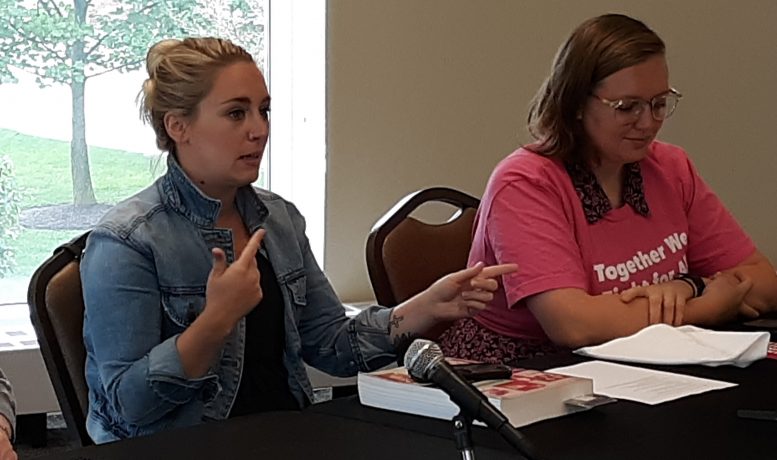By JAN LARSON McLAUGHLIN
BG Independent Rights
In spite of growing legal roadblocks, women are still able to have abortions performed in Northwest Ohio.
But those providing the services face an ongoing fight for women’s reproductive rights.
Three women committed to that fight spoke recently at Bowling Green State University during a teach-in hosted by the Center for Women and Gender Equity.
One of the speakers was Dr. Ann Nunnally, who is one of the two surgeons to provide abortion services at the remaining clinic, Capital Care of Toledo.
“I’m devoted,” Nunnally said of her commitment to continuing reproductive care at the facility. Nunnally, who asked that her photograph not be included because of threats to physicians who perform abortions, told her audience that she had three abortions early in her adulthood, then later gave birth to four daughters. She has been performing abortions since 1979, first in Chicago and now in Toledo.
The other speakers were Marlena Ainslie, administrator of Capital Care in Toledo, and Kristen Robideaux, regional field manager for Planned Parenthood in Toledo.
The three women talked of all the efforts to block women from making choices in their reproductive health – some blatant and some more veiled.
“It’s taken me a long time to realize how much sexism there is in medical care,” Nunnally said.
Women are often unaware that by going to a Catholic-affiliated hospital, their reproductive care is restricted, she said.
“If you go to a Catholic hospital, you probably won’t get the morning after pill,” even in cases of rape, Ainslie said.
In some cases, women with high-risk pregnancies for the mom are given fewer options.
“Some of these things are so subtle,” Ainslie said.
At some facilities, women seeking hysterectomies are required to have “permission slips” from their spouses – though men seeking vasectomies don’t have the same requirements.
And state legislators make laws about medical issues they know little about, the women agreed.
“These people are coming into Planned Parenthood everyday,” Robideaux said of the women denied services elsewhere.
In Ohio, pharmacies are allowed to refuse to fill birth control prescriptions, or any prescriptions from clinics like Capital Care in Toledo.
Using the “conscience rule,” pharmacies can deny the medication, Ainslie said. “Government thinks women can’t think for themselves.”
And it’s not uncommon for embarrassed women to leave the pharmacy without being given their prescription slip, she added.
“A white old man in a white lab coat tells her ‘no,’” and many women don’t realize they have the right to get the prescription slip back, Ainslie said.
Some women still face that kind of humiliation when trying to get birth control from their physicians in more rural areas.
“They know they’re not married, so why would they be having sex,” Robideaux said. Some women are still lectured about their “morally wrong” sex lives. “We’re losing access to non-judgmental physicians. You should never be shamed by your doctor.”
Making matters worse is the risk that Ohio schools will soon be able to teach abstinence only in sex education courses. “Sex education in schools is going by the wayside,” Robideaux said.
The legal hoops for abortion providers have resulted in many clinics closing in Ohio, Ainslie said. There are currently only two physicians who provide medical abortions with pills and surgical abortions at the sole clinic left in Northwest Ohio. Those physicians also work at other clinics, so they can only be at the Toledo facility two mornings a week.
The women coming for care have more hoops to jump through as well. First, they must walk past protesters who challenge their choices.
“It’s legal in Ohio to harass abortion providers,” Ainslie said.
Women seeking abortions must come in for a consultation at least 24 hours before the procedure. The staff must perform an ultrasound and inform the woman of the state and age of the fetus. They must talk about the risks of abortion, “which are monumentally less than going through a pregnancy,” Nunnally said.
The clinics must also meet needless physical requirements, Nunnally said. For example, one of the latest rules is that hallways in the clinics must be wide enough for emergency room gurneys. “Even though the patients will never be on a gurney,” she said.
“It will severely deplete these private clinics’ funds,” Robideaux said. “So much is rooted in propaganda and misinformation.”
More legislation is on the horizon that will further burden clinics, Robideaux said. One bill will require that fetal tissue be disposed of in a specific burial or cremation process. Another would ban insurance from covering any procedures at clinics that provide abortions.
Last year, Ohio took away funding for services like pregnancy tests and sexually transmitted infection tests at clinics.
“These are very blatant and intentional attacks,” said Robideaux, who acts as an escort for women entering and leaving the Toledo clinic. “They are trying to make it financially inaccessible. The people being harmed the most by this are poor folks.”
Current Ohio laws prohibit abortions after 20 weeks, except in the case of life risk to the mother. Partial-birth abortions are banned. Any abortion after 20 weeks must be performed at a hospital with two physicians on hand.
“This fight is only getting harder, unfortunately,” Robideaux said.





